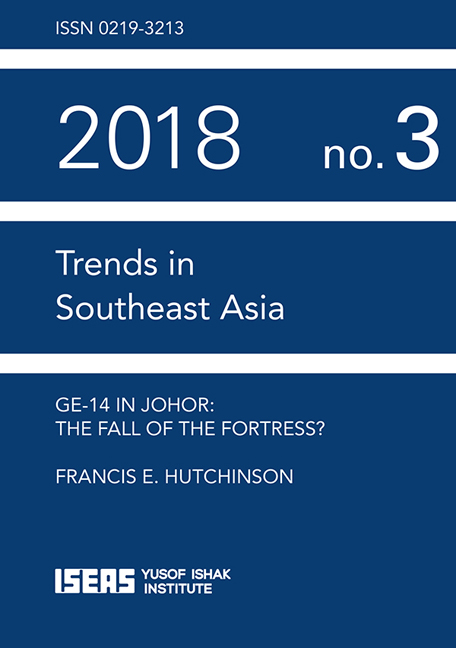GE-14 in Johor: The Fall of the Fortress?
Published online by Cambridge University Press: 12 February 2019
Summary
INTRODUCTION
The run-up to the 14th General Elections in Malaysia has been captivating and unpredictable. Beyond the machinations within and between the coalitions of the incumbent Barisan Nasional (BN), the Opposition Pakatan Harapan, and the dark horse Gagasan Sejahtera, attention is centring on key states that can deliver large numbers of parliamentary seats to the victor.
Selangor has captured the most attention, as it is the country's largest and wealthiest state and has been run by the Opposition for a decade. However, other states are no less strategic. Johor, Sabah and Sarawak have traditionally been seen as BN's “safe deposits”, consistently delivering substantial numbers of parliamentarians and solid state-level majorities to the ruling coalition. Should one or more of these fall, BN's hold on power can be seriously compromised.
Due to its unique culture and political significance, Johor merits special analysis. With some 3.7 million citizens and residents, it is Malaysia's third largest state and has the second largest number of parliamentarians. Johor is also one of the country's main economic “motors”. Its vast swathes of flat, fertile land generate an important proportion of the country's palm oil output. The state also has a large and diversified manufacturing sector, consisting of important clusters of furniture makers, textile producers, and electrical and electronics firms.
Recent policy initiatives look to further cement Johor's economic status. The high-profile Iskandar Malaysia initiative has sought to catalyse the higher education, healthcare, entertainment, and logistics sectors. Some of these efforts have borne fruit, as seen in the number of international university campuses and hospital facilities being established. In addition, the state houses the Pengerang Integrated Petroleum Complex, a sprawling 20,000-acre project with oil refining, petrochemical plants, and liquefied natural gas import and regasification facilities. And, much of the High-Speed Rail between Kuala Lumpur and Singapore will run through Johor, with three stations and large-scale transit-oriented development projects planned.
Besides being a vital part of the nation's economy, a number of attributes make Johor's electoral outcome assume even greater importance. The state is ethnically mixed. In addition to its bumiputera majority of 60 per cent, it has substantial numbers of Chinese and Indian voters, comprising 33 and 7 per cent of the population, respectively (DOS 2017).
- Type
- Chapter
- Information
- GE-14 in Johor , pp. 1 - 42Publisher: ISEAS–Yusof Ishak InstitutePrint publication year: 2018

